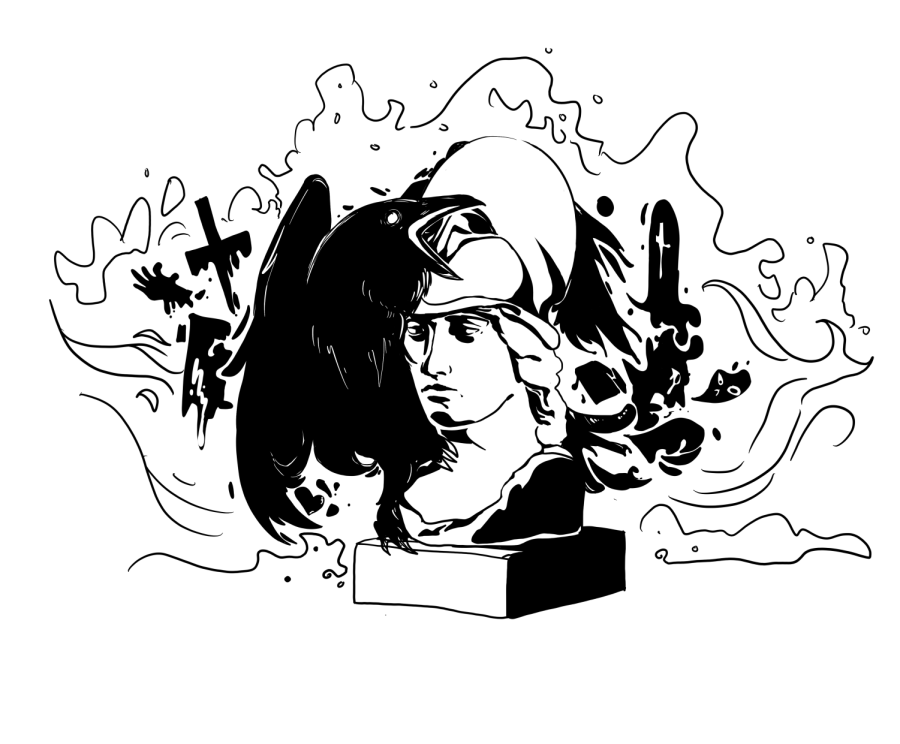Friday Five: Poe(ms)
An illustration representing various motifs in some of Edgar Allan Poe’s most famous poems. Many regard Poe as the greatest poet to ever live.
March 8, 2023
Edgar Allan Poe died of consumption. But even a century and a half later, his works continue to gnaw at me; their biting twists and subtle nuance are truly captivating. Each poem he writes is layered with a grief so authentically human, so heart-wrenchingly beautiful, that I can’t help but marvel at Poe’s literary genius. And sure, he may have been unhinged, but it’s that madness which seeps into every one of his poems that makes them uniquely Poe. His deliciously macabre interpretations of classical writings offer a reading experience which I have found to be unmatched by other authors. Deftly weaving between reality and insanity, Poe casts an illusory atmosphere over his compositions, complemented by crisp wit and cynical undertones. Alas, what more could be desired?
5. “The Sleeper”
A sleeper indeed, few critics rank “The Sleeper” as one of Poe’s better works. But there’s something about the vivid descriptions and the haunting imagery that is just so captivating.
To begin, Poe rewrites the classically gothic cemetery as a place teeming with wildlife, juxtaposed to the death it represents. With the central premise being that the narrator conflates his dead lover with her sleeping, the poem is certainly much lighter than Poe’s other works, and that airiness gives the whole scene a lovely ephemeral quality. Near the end, the narrator becomes slightly disturbed, but the tone is rather cogent for the most part, unfortunate for a Poe poem. The imagery and vivid descriptions are what makes the poem work so well, but it just lacks that Poe-esque flair. Neither truly macabre nor manic, “The Sleeper” is certainly a well-written poem, just not that interesting of one. Nevertheless, it remains an amusing poem, nice as a recreational read.
4. “Annabel Lee”
“Annabel Lee” – Poe’s take on the classic children’s poem. Of course, it wouldn’t really be a Poe poem without a reference to a lover’s death, so that’s thrown in there as well. Maintaining a steady tempo throughout, “Annabel Lee” reads like a nursery rhyme, but a dark, disturbing one that concludes with a man lying by the corpse of his wife on a nightly basis. That perfectly creepy take on the motif of children’s tales is done exquisitely, slowly getting more unsettling as the poem progresses. Truly scrumptious. Poe’s depictions of insanity and grief really shine here, accentuating the cliché love story with a tragic twist not many writers could pull off. While it still plays off a simplistic pattern, Poe’s rendition changes the mood entirely, a fascinating work of art indeed.
3. “A Dream Within A Dream”
In “A Dream Within A Dream,” Poe ponders the existential question of whether anything in life is truly real, swiftly sinking into insanity. The narrator’s desperation is palpable as he attempts to assure himself that his actions are indeed relevant, but his efforts prove futile. As he hopelessly seeks to grasp hold of reality, time itself eludes him, leaving the narrator in a state of pure despair. Despite the depressing depictions, the emotion Poe evokes in a mere two stanzas is absolutely stunning. The richness, the depth of the speaker’s internal struggle perfectly showcases Poe’s literary mastery, a testament to his talent. Simply beautiful and filled with intricate nuance, the only lament I have for “A Dream Within A Dream” is that it’s too brief, much like a dream in passing.
2. “Alone”
“And all I lov’d – I lov’d alone–” Poignant and introspective, “Alone” reflects back on Poe’s childhood and what influenced his uniquely dark style of poetry. He reveals that the source of his sorrows stems from the death of all his loved ones, catalyzing an infatuation with writing about death and the grief it produces. While not as dramatically insane as his other works, there’s something about Poe’s willingness to be so openly vulnerable that induces a sense of sympathy. For behind his grim, gaunt exterior, it seems he’s unable to escape the trauma that haunted him as a child. And the evocation of that hopelessness is more tragic than any of Poe’s fictional poems, a brutally agonizing confession. His genuine feeling of loss and heartache is palpable, and it’s what makes “Alone” so intensely personal as a poem.
1. “The Raven”
Ah, distinctly I remember, it was in the bleak December when I first encountered “The Raven” by the esteemed figure Poe. Immediately, I was drawn to Poe’s eccentric style, the part of himself he infused in every line. And even after reading all his other poems, “The Raven” still holds a special place in my heart, the epitome of all that is Poe. Free-flowing lyricism, layered emotions, exquisite detail, all culminating with a man driven mad by grief. Absolutely perfect. And the titular raven’s instigation of the narrator’s insanity with only a singular word is a masterful metaphor, showing how unstable he has already become. Each verse transitions beautifully into the next in captivating fashion, grasping the reader’s attention and never letting go. Perhaps my soul was trapped in the shadow of “The Raven” that lies floating on the floor, since lifted nevermore. Throughout the wintry seasons, I find myself coming back to it again and again, since ingrained in my mind. Elegant and eloquent, “The Raven” remains a culmination of everything Poe, truly his magnum opus.




![LALC Vice President of External Affairs Raeanne Li (11) explains the International Phonetic Alphabet to attendees. "We decided to have more fun topics this year instead of just talking about the same things every year so our older members can also [enjoy],” Raeanne said.](https://harkeraquila.com/wp-content/uploads/2025/10/DSC_4627-1200x795.jpg)


















![“[Building nerf blasters] became this outlet of creativity for me that hasn't been matched by anything else. The process [of] making a build complete to your desire is such a painstakingly difficult process, but I've had to learn from [the skills needed from] soldering to proper painting. There's so many different options for everything, if you think about it, it exists. The best part is [that] if it doesn't exist, you can build it yourself," Ishaan Parate said.](https://harkeraquila.com/wp-content/uploads/2022/08/DSC_8149-900x604.jpg)




![“When I came into high school, I was ready to be a follower. But DECA was a game changer for me. It helped me overcome my fear of public speaking, and it's played such a major role in who I've become today. To be able to successfully lead a chapter of 150 students, an officer team and be one of the upperclassmen I once really admired is something I'm [really] proud of,” Anvitha Tummala ('21) said.](https://harkeraquila.com/wp-content/uploads/2021/07/Screen-Shot-2021-07-25-at-9.50.05-AM-900x594.png)







![“I think getting up in the morning and having a sense of purpose [is exciting]. I think without a certain amount of drive, life is kind of obsolete and mundane, and I think having that every single day is what makes each day unique and kind of makes life exciting,” Neymika Jain (12) said.](https://harkeraquila.com/wp-content/uploads/2017/06/Screen-Shot-2017-06-03-at-4.54.16-PM.png)








![“My slogan is ‘slow feet, don’t eat, and I’m hungry.’ You need to run fast to get where you are–you aren't going to get those championships if you aren't fast,” Angel Cervantes (12) said. “I want to do well in school on my tests and in track and win championships for my team. I live by that, [and] I can do that anywhere: in the classroom or on the field.”](https://harkeraquila.com/wp-content/uploads/2018/06/DSC5146-900x601.jpg)
![“[Volleyball has] taught me how to fall correctly, and another thing it taught is that you don’t have to be the best at something to be good at it. If you just hit the ball in a smart way, then it still scores points and you’re good at it. You could be a background player and still make a much bigger impact on the team than you would think,” Anya Gert (’20) said.](https://harkeraquila.com/wp-content/uploads/2020/06/AnnaGert_JinTuan_HoHPhotoEdited-600x900.jpeg)

![“I'm not nearly there yet, but [my confidence has] definitely been getting better since I was pretty shy and timid coming into Harker my freshman year. I know that there's a lot of people that are really confident in what they do, and I really admire them. Everyone's so driven and that has really pushed me to kind of try to find my own place in high school and be more confident,” Alyssa Huang (’20) said.](https://harkeraquila.com/wp-content/uploads/2020/06/AlyssaHuang_EmilyChen_HoHPhoto-900x749.jpeg)












